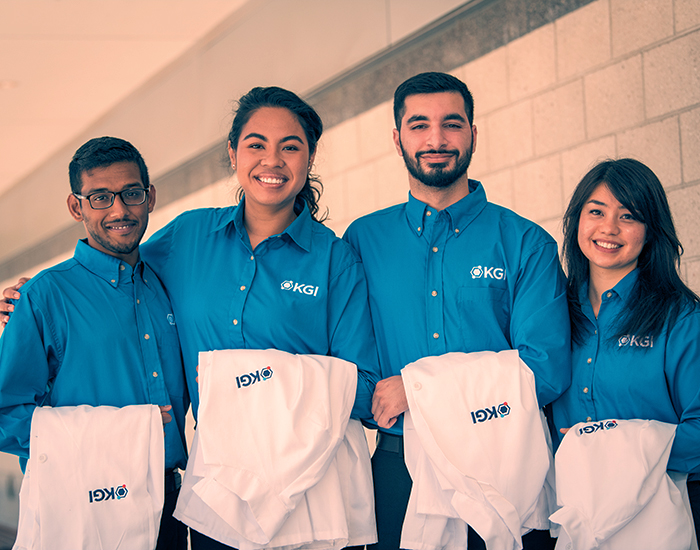A PharmD (Doctor of Pharmacy) is a professional doctorate degree and is usually a four-year program. A PharmD program differs from a PhD program in that a PhD prepares you for a career in academia and research, culminating in a dissertation.
By contrast, you pursue a PharmD with the intention of working in pharmaceuticals, usually either in clinicals (prescribing medication to patients) or industry (bringing medications to the market).
Prerequisites include foundational science courses such as physics and organic chemistry. Most pharmacy schools require you to complete a four-year bachelor's degree before applying, although Keck Graduate Institute (KGI)'s School of Pharmacy and Health Sciences (SPHS) has partnered with community colleges to enable you to receive your PharmD in as little as six years from the time you graduate high school.
What Can You Do With a PharmD?
With the emergence of cutting-edge technologies like gene and stem cell therapies—along with innovations in medical devices—the field of pharmaceuticals is rapidly evolving. Diseases that were once elusive are now treatable. Personalized medicine and pharmacogenomics allow for more targeted treatment of conditions while reducing adverse side effects.
Obtaining a PharmD is your gateway to this exciting field, whether your goal is to work directly with patients or to bring promising new treatments to the public. With a PharmD, you can embark upon a variety of career paths beyond neighborhood or hospital pharmacist, including informatics, regulatory pharmacy, and research and development.
KGI's PharmD Program
When you're looking for schools, you want to choose a degree program that equips you with the skills needed to meet the demands of this changing industry. In KGI's PharmD program, faculty are industry leaders in the fields of biotechnology, genomics, and informatics who keep abreast of the latest medical developments. This ensures that the curriculum stays fresh and relevant.
Students not only learn the mechanisms of disease and drug interactions, but also the regulatory and entrepreneurial aspects of the industry. By the end of the program, they are familiar with every aspect of the drug development process.
KGI partners with hospitals, pharmaceutical companies, and government organizations to provide experiential education for students. Many students go on to secure jobs and fellowships, sometimes with these same companies, as a result of these rotations.
Professional development is one of the hallmarks of the PharmD program. Through team projects, students gain hands-on experience while also building the communication and interpersonal skills vital to excelling in the industry.
PharmD Curriculum
KGI's new PharmD curriculum, designed by Dean Dr. Martin Zdanowicz and the school's faculty, combines basic science and clinical courses into integrated sequence courses. This allows students to immediately apply their foundational science knowledge to a clinical context.
In addition to the PharmD degree, students receive a certificate in one of four areas:
- Medical Therapy Outcomes (MTO)This concentration is geared toward those who enjoy working with people—including patients, physicians, and hospital staff—and want to witness the impact of their work. It equips you with the skills needed to care for patients in underserved populations, rural areas, and accountable care organizations. Emphasis is placed on pharmacogenomics and issues regarding patient transition through different levels of care.
- Healthcare Management (HCM)The HCM program equips students with the management and leadership skills needed to shape healthcare policies and decisions that have large-scale impact. Students gain management training and experience, where they learn how to work directly with companies or government organizations to provide patient care in the most efficient and cost-effective way possible while adhering to safety standards and improving product quality.
- Health Information Technology (HIT)In the HIT program, students learn how to utilize healthcare technology to improve patient experience and healthcare quality while reducing costs and clinician error. This includes the use of automation and robotics to enhance safety and medication adherence. Special emphasis is placed on the ethical use of technology and data.
- Medical and Clinical Affairs (MCA)Medical and clinical affairs professionals play a vital role in researching, developing, and bringing pharmaceuticals and medical devices to the market. They have a wide range of responsibilities spanning the drug or device lifecycle from conception to post-market monitoring. This includes ensuring that medications are compliant with FDA regulations, overseeing clinical trials, and labeling and advertising products. The MCA program equips students with the knowledge needed to stay abreast of regulations and safety guidelines.
Through all of its courses, the SPHS prepares you to enter the evolving landscape of the pharmaceutical industry and take on a number of diverse roles. You are encouraged to try out many roles to find which one fits you best.
You can learn more about the PharmD program here.
